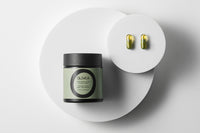In the quest for a heart-healthy diet, extra virgin olive oil (EVOO) emerges as a vital player, particularly regarding its impact on cholesterol levels. Renowned for its role in the Mediterranean diet, EVOO's influence on cholesterol management is a key factor in its cardiovascular benefits.
The Phenolic Power of EVOO on Cholesterol1. Protecting LDL Particles from Oxidative Damage
Extra virgin olive oil, especially the high-polyphenol varieties, has been shown to exert protective effects on LDL cholesterol. A critical review by the European Food Safety Agency (EFSA) George et al. in "Critical Reviews in Food Science and Nutrition" (2019) highlights the role of EVOO's polyphenols in safeguarding LDL particles from oxidative damage1. This protective action is crucial, as oxidized LDL is a major risk factor for the development of atherosclerosis and subsequent heart diseases (George et al., 2019).
2. Impact on Postprandial LDL LevelsThe polyphenols in olive oil not only protect LDL particles but also modulate their levels postprandially. A study by Covas et al., published in "Free Radical Biology and Medicine" (2006), demonstrated how olive oil phenolic compounds can influence LDL phenolic content and oxidation after meals. This finding is significant, as it suggests that regular consumption of EVOO could help in maintaining healthier LDL levels throughout the day2. (Covas et al., 2006).
3. Maintaining Normal Blood HDL Cholesterol ConcentrationsIn addition to its effects on LDL cholesterol, EVOO also plays a role in maintaining normal levels of HDL cholesterol, often referred to as 'good cholesterol.' EFSA The European Food Safety Authority (EFSA) has also acknowledged the ability of olive oil polyphenols to maintain healthy HDL cholesterol levels, further underscoring EVOO's comprehensive benefits in cholesterol management.
Conclusion
The influence of extra virgin olive oil on cholesterol management, particularly through its rich polyphenolic content, positions it as a key dietary component for heart health3. Its ability to protect LDL from oxidation, modulate postprandial LDL levels, and maintain healthy HDL cholesterol concentrations make EVOO an excellent choice for those seeking to improve their cardiovascular health through diet. Incorporating EVOO into daily meals could be a simple yet effective strategy in the broader context of heart disease prevention and wellness.
References
- Scientific Opinion on the substantiation of health claims related to polyphenols in olive and protection of LDL particles from oxidative damage (ID 1333, 1638, 1639, 1696, 2865), maintenance of normal blood HDL cholesterol concentrations (ID 1639… . EFSA J 2011;9:2033. https://doi.org/10.2903/j.efsa.2011.2033.
- Covas M-I, de la Torre K, Farré-Albaladejo M, Kaikkonen J, Fitó M, López-Sabater C, et al. Postprandial LDL phenolic content and LDL oxidation are modulated by olive oil phenolic compounds in humans. Free Radic Biol Med 2006;40:608–16. https://doi.org/10.1016/j.freeradbiomed.2005.09.027.
- Covas M-I, Nyyssönen K, Poulsen HE, Kaikkonen J, Zunft H-JF, Kiesewetter H, et al. The Effect of Polyphenols in Olive Oil on Heart Disease Risk Factors. Ann Intern Med 2006;145:333. https://doi.org/10.7326/0003-4819-145-5-200609050-00006.



